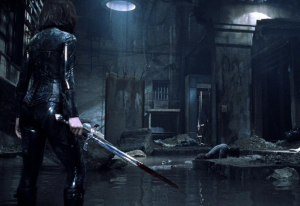Less than one year after the 16-bit original made its way to North America, Square Enix is releasing the 3D remake of Trials of Mana. The sequel to the beloved action RPG Secret of Mana maintains the most recognizable gameplay staples of its predecessor, while also adding new narrative mechanics designed to add replay value to a straightforward ARPG experience. But the multi-threaded story may not achieve that goal and some aspects of the game’s modern update work against it. The final product is a fascinating study in what happens when an old favorite loses its charm through modernization.
Videos by ComicBook.com
One of Trials of Mana‘s big hooks is that the game has six main characters, but you can only play as three at a time. You choose one to be your main character, and two to be your companions. Each character has a unique introductory chapter and brings something different to the party in combat. Which combination of heroes you choose affects certain details of the game’s stories. Which hero you choose as your main character determines which of three final bosses you face, for example.
It sounds more complicated than it is. Each character’s origin involves parental issues and a proximity to power in a particular kingdom. While there are six characters, they come in pairs that share a rival enemy. The villain corrupts the kingdom that one of the characters belongs to, convincing it to invade the other character’s kingdom. The main character’s story involves opposing the plans of that villain. It’s a system that, through some unusual alchemy, manages to be both unique and formulaic at the same time.
It’s a simple story with simple characters created for a simpler gaming generation. The update to fully-voiced 3D saps it of some of that simple charms, as it replaces high-end 2D sprites with 3D characters that look like dolls with anime eyes glued to their faces. The powerful female magicians that make up the kingdom of Altena look like they’re wearing sexy witch costumes from Party City. The voice acting isn’t convincing either, which mostly boils down to the melodramatic writing, but then there’s the decision to have Charlotte’s voice actor deliver her lines in baby talk, replacing every “r” and “l” with a “w,” which is as baffling as it is grating.
It’s hard not to contrast this effort to that other JRPG update Square Enix released this year. With Final Fantasy VII Remake, they took a game that pushed the limitations of its era and helped it achieve the fidelity it always aspired towards. With Trials of Mana, they’ve taken a game that was comfortable in its day and dragged it into the conventions of an era that it doesn’t belong in. The game wears the trappings of the modern age like a child trying on their parents’ clothes. Much of the charm of these 16-bit JRPGs come from players filling in the details with their imaginations. Instead of enhancing the game, this new technology only brings its shortcomings more into focus, like getting too close to a painting and seeing every awkward brush stroke.
The game’s combat fairs better, though it still carries some awkward flaws of its own. Here again, it’s interesting to compare it to Final Fantasy VII Remake as the two games share a similar battle system. Each sees the player controlling three characters in real-time combat. The player can pause the action to use items and abilities, some of which are charged by a gauge that fills over time. The combat is fun and breezy and the grand boss battles offer a reasonable challenge to shake things up. The game rewards bonus experience for efficiency, speed, and using special moves. This is an effective means of encouraging players to remain engaged even during routine battles. Trials keeps Secret‘s ring menu system that many fans are fond of even today. I’ve always felt that it was, at best, an awkward middle ground between turn-based combat and the pop-up menus employed by modern ARPGs. Trials doesn’t do anything to change my mind about that.
The way character progression works is another example of the game creating complex simplicity. Each character has six main stats and whenever they gain a level, they get a point to spend in any of those stats. Spend enough points and you unlock stat boosts and new abilities. In theory, it should allow for a range of customizability, and it does to a point, though there are two problems. One is that some of these abilities may not be usable when they’re earned. Much of the game involves the characters searching for eight elementals. Until you meet each of these elementals, you can’t use powers associated with their element, even if you’ve unlocked them. For example, you can unlock Angela’s Holy Bolt, but you can’t use it until you meet your first elemental, Lumina the Light Elemental. This puts roadblocks in place that the player either has to deal with or work around.
The other problem is that you can only slot in two abilities per character early in the game. Once you reach a certain level, you unlock a new class for your character, which opens up some new options and new ability slots, but it’s a long wait to get there. In the meantime, after unlocking your top two abilities, you stockpile more with no place to slot them in. Combat starts to feel stale well before you unlock your first class. Once you do unlock the class system, the game starts to take off, but such a long wait for it is a problem for a game that wants you to play through it at least two or three times.
If you’ve never played Trials of Mana, you might consider checking out the Collection of Mana released last year for the Nintendo Switch. The collection allows you to play the entire Seiken Densetsu trilogy in their original 2D glory. This remake does recreate the world of Trials with a wondrous, effervescent glow, but that doesn’t make up for the clumsy presentation. If you’ve played the game before and are fond of it, or don’t mind the remake’s storytelling style, this may be an interesting means of seeing the game in a new light. The combat is fun even if the progression system hamstrings it early on, but the update does more to hold the game back than to breathe new life into it.
Rating: 3 out of 5
Trials of Mana releases for PlayStation 4, Nintendo Switch, and PC on April 24th. A retail code was provided by the publisher for PlayStation 4 for the purpose of this review.








